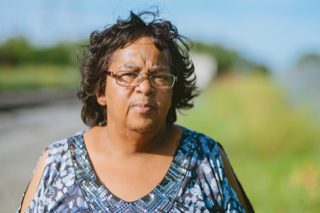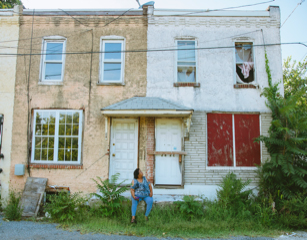
The first thing I notice in a brief phone conversation with Zulene Mayfield, is the deep sense of exhaustion in her voice. It’s also the first thing I ask about when I meet her in person. “You got to keep moving” she tells me bluntly. “If you’re Black in America it’s exhausting work to begin with, period.” But the sound and sense of her exhaustion is just the top layer. “So, yeah. I’m tired” she says. “I’m tired. I’m perturbed. And I’m pissed the fuck off.”
One target of Mayfield’s righteous ire is the Covanta “waste-to-energy” facility located at 10 Highland Ave, Chester, PA 19013. Though Covanta has only been at the helm of this facility since 2005, the facility itself has been there since 1992. And don’t be fooled by the trendy industry euphemisms – “waste-to-energy” or the current favorite, “trash-to-steam.” The deadly outcomes for Chester residents remain the same.

The children of Chester develop asthma at five times the rate of the national average. Rates of asthma, cancer and heart disease amongst adult residents of Chester also outstrip the regional and national averages. “I want my family to survive,” she says as her emotions begin to overtake her. “I want my nieces and my nephews and the people that I love to survive . . . to have a chance . . .”
Put the Covanta address into Google Maps and figure out whether or not you live within the 15-to-17-mile radius of the largest trash incinerator in the nation. If you do, you might be inhaling dozens of pollutants including sulfur dioxide and particulate matter – microscopic airborne particles that are often hazardous to your health and tiny enough to get into your bloodstream. “We don’t bottle the air up in Chester and keep that shit here,” Mayfield warns. “The pollutants from that stack travel 17 miles.”
Mayfield is a wizened veteran of what might be best understood as the waste management wars in Chester, Pennsylvania. Born and raised in Chester, Mayfield remains righteously committed to her right to defend her home front. The house, 2820 Front St where Mayfield used to live, faces the Covanta plant/incinerator. Separated by a railroad track, it’s almost as if Covanta was built in the front yards of the now mostly abandoned Front street properties on this block.
“I’m not an activist,” she tells me. “I am not an environmentalist. I’m a survivalist.”
This isn’t all about anger and frustration for Mayfield. She is also sad and disgusted at the tragedy of it all. How, in the 21st century can we blatantly dump trash and all forms of human waste in one town, sickening and killing its mostly poor Black and Brown residents?
“You grow up with the belief that you have a cancer gene in your family. Which is a lie,” she said. “As you grow up and realize what you’ve been exposed to and what you’re being exposed to, it makes sense. It makes sense why I had an aunt who never smoked, drank or anything that died of cancer. It makes sense why my 15-year-old baby sister died of cancer – liver cancer. We had to take her three times a week to Johns Hopkins (Cancer Treatment Center).”
On a walking tour that takes us through the geographic trenches of the battle for the air that this community breathes, she reluctantly talks a little bit about herself. “When we were younger. Stuff would leak from underneath the trains – white powder, grey powder . . . We used to play in it. We used to put it in bags or balloons and throw it at each other. It was chemicals.”
Chester has been transformed from a bustling manufacturing town throughout much of the 20th century, into a hollowed out dumping ground for the entire east coast (and Ohio too). Less than two percent of the trash incinerated in the Covanta facility actually comes from the city of Chester. Ninety-eight percent of the garbage “managed” at Covanta comes from outside of Chester with nearly a third of that coming from Philadelphia alone.
When I ask Mayfield what her message would be to the municipal government of Philadelphia she replies without hesitation. “Tell the truth about who you are poisoning. You are poisoning our children every fucking day.”
Using Chester, PA as a regional dumpster is not consistent with the “brotherly love” slogan of the state’s most populous city. For Mayfield, Philly dumping its trash and recyclables in Chester is indicative of how nearly all elected officials – in Chester, in Philadelphia, and in the state of Pennsylvania, essentially choose to ignore the plight of those who are being polluted daily in her hometown. If we are honest, we know that race and poverty are at the heart of this crisis. Because the victims are mostly Black and Brown and poor, they remain invisible and the perpetrators are legally permitted to pollute Chester, Pennsylvania with relative impunity.
“This is my home,” Mayfield says. “I don’t care what anybody thinks of it.” And, she warns, air has no geographic boundaries. The poisons that pollute the air in Chester will surely become the air that we breathe in Philly and beyond. “If you can’t breathe, you can’t do anything,” Ms. Mayfield says in her signature retroactive tone. She speaks to me – and to us — as if she’s been telling us about the environmental injustice in Chester for a very long time. And in fact, she has. The freedom to breathe she tells me – is our “most basic right.”



